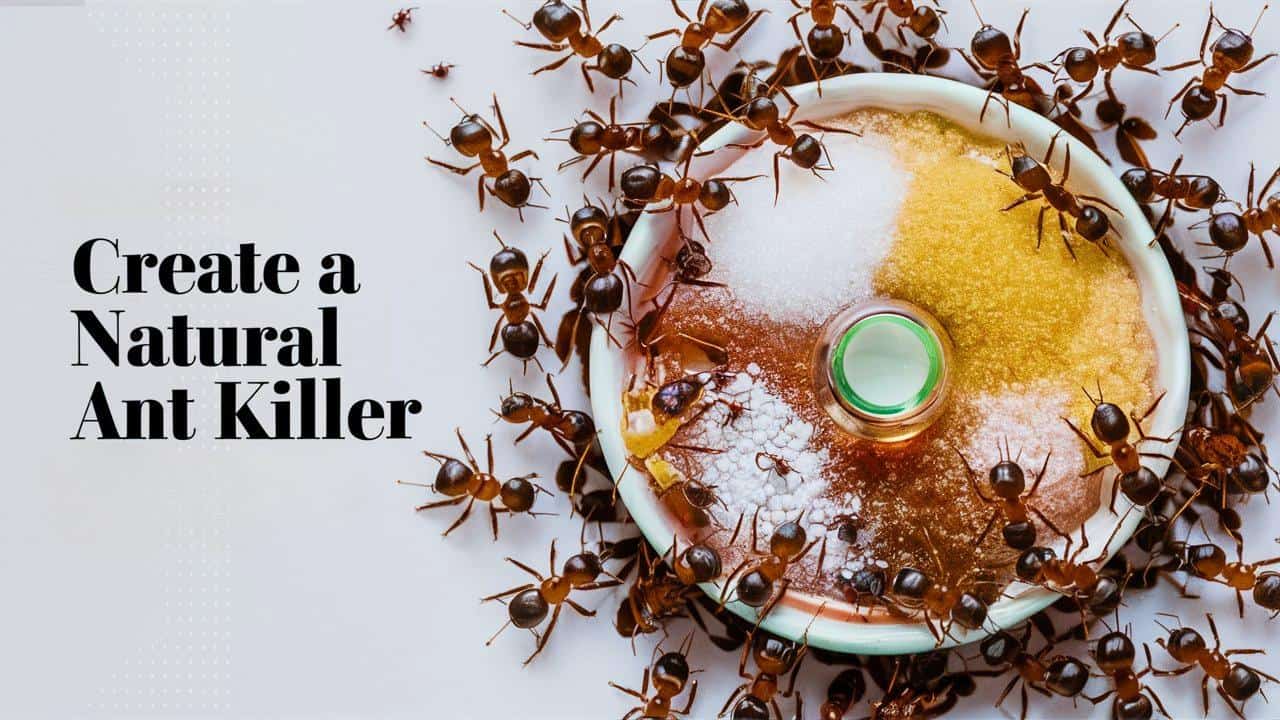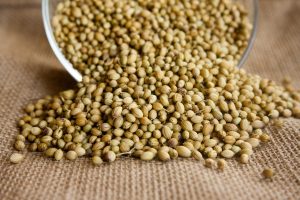Ants. They’re everywhere, aren’t they? These tiny creatures can quickly turn your home into their own personal buffet, leaving trails of crumbs and unwelcome guests in their wake. While store-bought ant killers can be effective, they often contain harsh chemicals that you might not want around your family and pets.
Fear not! There are plenty of natural ways to get rid of ants without resorting to toxic solutions. Let’s explore some effective and eco-friendly methods:
Natural Ways To Kill Ants
Before we get into specific recipes, it’s important to understand why these methods work. Ants rely on pheromone trails to navigate, communicate, and locate food sources. By disrupting these trails and creating barriers, we can deter them and even eliminate entire colonies.
Sugar and Borax Paste: A Deadly Delicacy
This classic method is a favorite for a reason. Ants are attracted to sugar, and borax is a naturally occurring mineral that’s toxic to them. Here’s how to make this irresistible trap:
Ingredients:
½ teaspoon borax
Eight tablespoons sugar
1 cup of warm water
Instructions:
Mix the borax and sugar in a bowl.
Slowly add warm water, stirring until you have a thick paste.
Place small amounts of the paste in shallow dishes near ant trails or where you’ve seen them entering.
Be sure to keep the paste out of reach of children and pets.
White Vinegar: A Pungent Repellent
Vinegar’s acidic nature acts as a natural repellent for ants. The strong smell masks their pheromone trails, confusing them and discouraging them from returning.
Ingredients:
1 cup of water
1 cup vinegar
Instructions:
Mix the water and vinegar in a spray bottle.
Spray the mixture directly on ant trails, entry points, and around areas where you’ve seen them.
You can also wipe down surfaces with the solution to create a barrier.
Peppermint: A Refreshing Deterrent
Peppermint oil is a powerful natural insecticide that ants find repulsive. It’s also a great way to freshen up your home!
Ingredients:
10 to 20 drops of peppermint essential oil
2 cups of water
Instructions:
Combine the peppermint essential oil and water in a spray bottle * Spray around entry points, window sills, and baseboards.
You can also place cotton balls soaked in peppermint oil near areas where you see ants.
Cinnamon: A Spicy Repellent
Cinnamon’s strong aroma is something ants find incredibly unpleasant. They’ll avoid areas with this scent, making it a great natural deterrent.
Ingredients:
Ground cinnamon
OR undiluted cinnamon leaf essential oil and water
Instructions:
Ground Cinnamon: Sprinkle ground cinnamon along ant trails, entry points, and around areas where you’ve seen them.
Essential Oil: Mix a few drops of cinnamon leaf essential oil with water in a spray bottle. Spray the mixture on areas where ants are present.
Lemon Juice: A Citrusy Barrier
Lemons are not only great for cleaning, but their acidic nature also acts as a natural ant repellent. Ants dislike the strong citrus scent and will avoid areas where it’s present.
Ingredients:
1 part of lemon
3 cups of water
Instructions:
Mix the lemon juice and water in a spray bottle.
Spray the mixture directly on ant trails, entry points, and around areas where you’ve seen them.
Black Pepper or Cayenne Pepper: A Spicy Surprise
Both black pepper and cayenne pepper contain capsaicin, a compound that ants find irritating. This can act as a deterrent, making them less likely to cross paths with your home.
*Ingredien
Black pepper or cayenne pepper sprinkle
OR Pepper and water mixture
Instructions:
Sprinkle: Sprinkle black pepper or cayenne pepper along ant trails and entry points.
Mixture: Mix a small amount of pepper with water in a spray bottle and spray the mixture on areas where ants are present.
Food-Grade Diatomaceous Earth: A Deadly Dust
Diatomaceous earth (DE) is a naturally occurring, powdery substance made from fossilized diatoms (tiny aquatic organisms). When ants crawl through DE, it cuts through their exoskeletons, dehydrating them and eventually killing them.
Ingredients:
Food-grade diatomaceous earth (FD)
Water or vinegar (optional)
Instructions:
Dry Application: Sprinkle FD directly along ant trails, entry points, and around areas where you’ve seen them.
Wet Application: Mix FD with water or vinegar to create a paste. Apply the paste to areas where ants are present.
Dish Soap and Water Mixture: A Slick Trap
Dish soap is a powerful surfactant, meaning it breaks down the surface tension of water. When ants come into contact with a soapy water mixture, it disrupts their ability to move and breathe, ultimately leading to their demise.
Ingredients:
Dish soap
Water
Instructions:
Mix a few drops of dish soap with water in a spray bottle.
Spray the mixture directly on ant trails, entry points, and around areas where you’ve seen them.
Liquid Detergent and Glass Cleaner: A Double Whammy
This method combines the power of a liquid detergent’s cleaning action with the slickness of glass cleaner to create a barrier that ants find impossible to cross.
Ingredients:
Liquid detergent
Glass cleaner or soapy water (hand soap, dish soap)
Instructions:
Mix a small amount of liquid detergent with glass cleaner or soapy water in a spray bottle.
Spray the mixture on ant trails, entry points, and around areas where you’ve seen them.
Tea Tree Essential Oil: A Powerful Repellent
Tea tree oil is a natural antiseptic with a strong, pungent aroma that ants find highly unpleasant. It’s a great way to create a barrier they’ll be reluctant to cross.
Ingredients:
5 to 10 drops of tea tree oil
2 cups of water
Instructions:
Combine the tea tree oil and water in a spray bottle.
Spray the mixture directly on ant trails, entry points, and around areas where you’ve seen them.
Eucalyptus or Lemon Oil: A Refreshing Deterrent
Eucalyptus or lemon oil is a natural insecticide that ants find repulsive. Its strong scent disrupts their pheromone trails and makes them less likely to return.
Ingredients:
Eucalyptus lemon essential oil
Cotton balls
Instructions:
Saturate cotton balls with eucalyptus or lemon essential oil.
Place the cotton balls near ant trails, entry points, and areas where you’ve seen them.
Boiling Water: A Quick and Effective Solution
Boiling water is a powerful and immediate solution for killing ants. It works by scalding them on contact, but be careful not to use it on surfaces that can be damaged by heat.
Ingredients:
Boiling water
Instructions:
Carefully pour boiling water directly onto ant nests or areas where you see them congregating.
Cornstarch: A Sticky Trap
Cornstarch is a simple and effective way to trap ants. When ants walk through cornstarch, it sticks to their feet, making it difficult for them to move and eventually leading to their demise.
Ingredients:
Cornstarch
Water (optional)
Instructions:
Dry Application: Sprinkle cornstarch along ant trails, entry points, and around areas where you’ve seen them.
Wet Application: Mix cornstarch with water to create a paste. Apply the paste to arehere ants are present.
Neem Oil: A Natural Insecticide
Neem oil is derived from the neem tree and is known for its insecticidal properties. It works by disrupting the ant’s hormonal system, making it difficult for them to reproduce and survive.
Ingredients:
Neem oil
Water
Instructions:
Mix a few tablespoons of neem oil with water in a spray bottle.
Spray the mixture directly on ant trails, entry points, and around areas where you’ve seen them.
Ground Coffee: A Bitter Barrier
Ants dislike the strong aroma of coffee, making it an effective deterrent. The caffeine in coffee can also be toxic to ants in high concentrations.
Ingredients:
Ground coffee
Instructions:
Sprinkle ground coffee along ant trails, entry points, and around areas where you’ve seen them.
Boric Acid: A Deadly Treat
Boric acid is a naturally occurring mineral that is toxic to ants. It works by disrupting their digestive system, leading to dehydration and death. This method is best used stations to prevent accidental ingestion by children and pets.
Ingredients:
½ teaspoon boric acid
Eight tablespoons of powdered sugar
1 cup of warm water
Instructions:
Mix the boric acid, powdered sugar, and warm water in a bowl until a paste forms.
Place small amounts of the paste in bait stations or near ant trails.
Important Tips:
Identify the Source: Find where the ants are entering your home and seal up cracks and crevices.
Clean Up: Keep your kitchen and other areas clean and free of crumbs and spills.
Patience is Key: It may take a few days or even weeks to see results from these natural methods.
Conclusion:
While ants can be a nuisance, you don’t have to rely on harsh chemicals to get rid of them. These natural methods are effective, affordable, and safe for your family and pets. Remember to be persistent, and you’ll soon be enjoying a pest-free home!





















